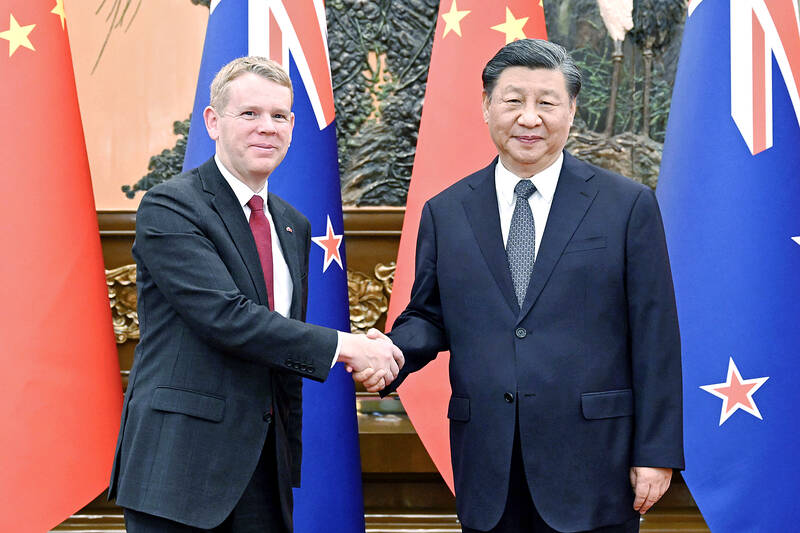New Zealand is carefully managing its relationship with China and must avoid getting pulled from “pillar and post” amid the strategic rivalry between China and the US, New Zealand Minister of Foreign Affairs Nanaia Mahuta said yesterday.
Mahuta’s comments came as New Zealand Prime Minister Chris Hipkins nears the end of a six-day visit to China leading a trade delegation, which included meetings with Chinese President Xi Jinping (習近平) and Chinese Premier Li Qiang (李強) focusing on economic partnerships and trade.
Hipkins has faced domestic criticism for not spending more time during his visit raising New Zealand’s concerns about human rights violations in China’s Xinjiang region.

Photo: AP
“China’s a complex relationship that we manage very carefully,” Mahuta said.
She said that Hipkins’ focus on trade did not shift New Zealand foreign policy, but shows that New Zealand has a range of interests with China.
In a statement after Hipkins’ meeting with Xi, there was no mention of human rights concerns or the Taiwan Strait.
Both were noted in the readout of the meeting between former New Zealand Prime Minister Jacinda Ardern and Xi in November last year.
“I’m under no shadow of a doubt that trade and economic issues would have been discussed, human rights issues, the war in Ukraine,” Mahuta said.
The Chinese Ministry of Foreign Affairs did not respond to a request for comment.
During the past five decades, “through joint efforts and based on mutual respect, seeking commonality while shelving differences” the relationship between the two countries had come a long way, a spokesman for China’s embassy in New Zealand said last week.
New Zealand has long been seen as a moderate or even absent voice on China in the Five Eyes intelligence-sharing alliance.
The country’s tone on security and China’s growing presence in the South Pacific toughened last year after China and the Solomon Islands struck a security pact.
Mahuta said that Hipkins’ visit to China after her own in March reinforces the delicate nature of the relationship.

A magnitude 7.0 earthquake struck off Yilan at 11:05pm yesterday, the Central Weather Administration (CWA) said. The epicenter was located at sea, about 32.3km east of Yilan County Hall, at a depth of 72.8km, CWA data showed There were no immediate reports of damage. The intensity of the quake, which gauges the actual effect of a seismic event, measured 4 in Yilan County area on Taiwan’s seven-tier intensity scale, the data showed. It measured 4 in other parts of eastern, northern and central Taiwan as well as Tainan, and 3 in Kaohsiung and Pingtung County, and 2 in Lienchiang and Penghu counties and 1

FOREIGN INTERFERENCE: Beijing would likely intensify public opinion warfare in next year’s local elections to prevent Lai from getting re-elected, the ‘Yomiuri Shimbun’ said Internal documents from a Chinese artificial intelligence (AI) company indicated that China has been using the technology to intervene in foreign elections, including propaganda targeting Taiwan’s local elections next year and presidential elections in 2028, a Japanese newspaper reported yesterday. The Institute of National Security of Vanderbilt University obtained nearly 400 pages of documents from GoLaxy, a company with ties to the Chinese government, and found evidence that it had apparently deployed sophisticated, AI-driven propaganda campaigns in Hong Kong and Taiwan to shape public opinion, the Yomiuri Shimbun reported. GoLaxy provides insights, situation analysis and public opinion-shaping technology by conducting network surveillance

‘POLITICAL GAME’: DPP lawmakers said the motion would not meet the legislative threshold needed, and accused the KMT and the TPP of trivializing the Constitution The Legislative Yuan yesterday approved a motion to initiate impeachment proceedings against President William Lai (賴清德), saying he had undermined Taiwan’s constitutional order and democracy. The motion was approved 61-50 by lawmakers from the main opposition Chinese Nationalist Party (KMT) and the smaller Taiwan People’s Party (TPP), who together hold a legislative majority. Under the motion, a roll call vote for impeachment would be held on May 19 next year, after various hearings are held and Lai is given the chance to defend himself. The move came after Lai on Monday last week did not promulgate an amendment passed by the legislature that

AFTERMATH: The Taipei City Government said it received 39 minor incident reports including gas leaks, water leaks and outages, and a damaged traffic signal A magnitude 7.0 earthquake struck off Taiwan’s northeastern coast late on Saturday, producing only two major aftershocks as of yesterday noon, the Central Weather Administration (CWA) said. The limited aftershocks contrast with last year’s major earthquake in Hualien County, as Saturday’s earthquake occurred at a greater depth in a subduction zone. Saturday’s earthquake struck at 11:05pm, with its hypocenter about 32.3km east of Yilan County Hall, at a depth of 72.8km. Shaking was felt in 17 administrative regions north of Tainan and in eastern Taiwan, reaching intensity level 4 on Taiwan’s seven-tier seismic scale, the CWA said. In Hualien, the